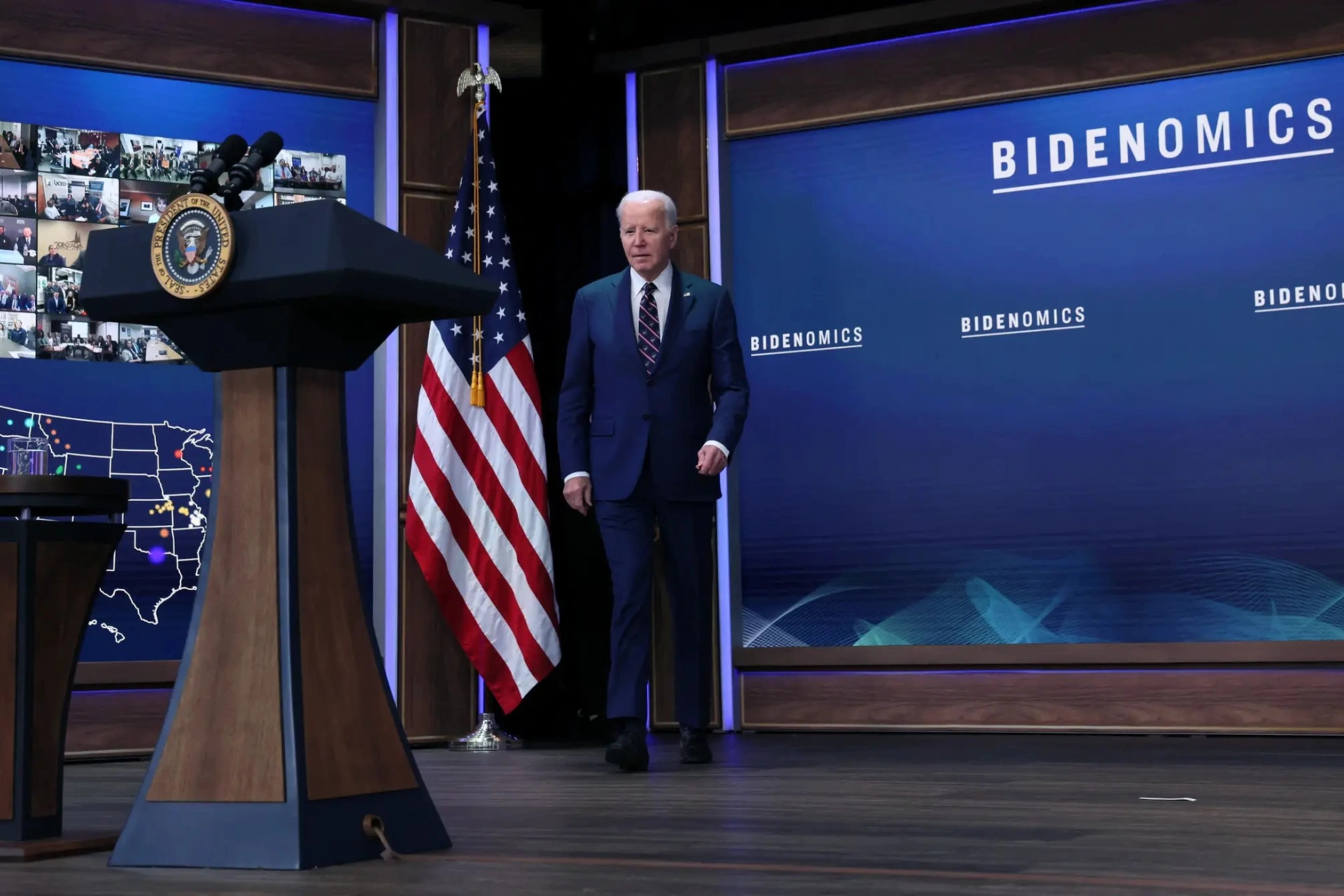Friendshoring’s Devil Is in the Details
The Joe Biden administration needs to decide if friendshoring is a paradigm shift or old wine in new bottles.

By experts and staff
- Published
Experts
![]() By Inu ManakSenior Fellow for International Trade
By Inu ManakSenior Fellow for International Trade![]() By Manjari Chatterjee MillerSenior Fellow for India, Pakistan, and South Asia
By Manjari Chatterjee MillerSenior Fellow for India, Pakistan, and South Asia
The Joe Biden administration is shaking up decades of consensus on global trade liberalization, and is charting a new path that seeks to redefine both the values and aims of U.S. trade policy. A major component of that rethink is its “friendshoring” strategy, first articulated by Secretary of the Treasury Janet Yellen, who declared last year that the United States would shift its supply chains away from rivals and to its partners. As she pointed out, the United States cannot allow some countries—notably China—to disrupt the global economy or exercise geopolitical leverage simply because they hold a predominant position in critical materials, technologies, or products. To counter this possibility, the administration would deepen economic integration only with countries it trusted. That is, the United States would friendshore.
Friendshoring as a global strategy has potential in today’s geopolitical environment. But in practice, it is difficult to operationalize. Important elements, such as how to identify trusted partners, what the benefits of friendshoring are for them, and whether friendshoring has implications beyond trade (such as in defense and diplomacy), remain unclear.
Why the United States Is Friendshoring
On its face, friendshoring seems like a sound strategy for three geopolitical reasons. First, we have shifted from a post–Cold War era where the United States clearly dominated as the sole superpower to a nascent multipolar period in which the United States is preeminent rather than predominant. This means that powerful actors such as China or Russia can cause both minor and major disruptions to the international order.
Second, multipolarity means that other actors and blocs, including those friendly or neutral to the United States, weigh more heavily in geoeconomic considerations. Countries such as India or blocs such as the Quad (the quadrilateral security dialogue between the United States, Australia, India, and Japan) or the African Union are more enmeshed in the global order. But they also hold beliefs and values that could conflict with prevailing norms. This can make setting global norms more difficult. In trade, for example, it can lead to rule fragmentation and competing economic blocs.
Third, the COVID-19 pandemic revealed supply-chain vulnerabilities due to specific product concentrations and pent-up demand. Though supply chains proved agile during the pandemic, many firms became more conscious of their production and distribution strategies. In turn, governments sought to better understand supply-chain disruptions and vulnerabilities, and identify where international coordination could help, particularly in sectors critical for trade and defense.
Friendshoring would seem to take account of all of this; the United States needs its partners to shore up, or even modify, the existing international order in the face of potential crises and challengers.
The Need to Clarify Friendshoring
The problems with the friendshoring paradigm are in the details. To begin with, friendshoring as a strategy and friendshoring as a tactic are often conflated. Friendshoring is both boosting relations with partners holding similar values as well as shoring up trade and global supply chains. It is identifying low-risk partners and shifting manufacturing to them.
That confusion aside, if focused on as a strategy, then Yellen’s definition of friendshoring—that it simply means deepening ties with countries that share U.S. norms and values about the global economy—is the starting point. But her definition also raises more questions than answers. China shares many, if not all, of the United States’ values about the global economy. The foundations of the Belt and Road Initiative or even the Asian Infrastructure Investment Bank, for example, are based on an acceptance of multilateral institutional norms, the core of the liberal international order. India, on the other hand, rejects many of the United States’ cherished global trade norms. It rejects negotiations to create new trade rules among coalitions of the willing at the World Trade Organization, and has been historically reluctant to sign trade agreements with anyone, including important strategic partners. Yet presumably, the Biden administration would like to friendshore with India, but not China.
The vagueness of the values necessary in a potential friendshoring partner has led to them to being interpreted both narrowly and widely—including everything from “countries where the risk of disruption from political chaos is low” to “economically low risk (countries)” and “(non-) strategic competitors.” Others, such as Canada’s Deputy Prime Minister Chrystia Freeland, have used the “D” word Yellen has been careful to avoid: democracy. But of course, this would throw out a number of “trusted partners” the United States would like to friendshore with (e.g., Saudi Arabia and Vietnam) and raise a host of questions about others (India, again).
Friendshoring’s effects are also unclear. That is, what does friendshoring add that simply boosting trade relations with friendly countries would not? The only way that friendshoring could be said to be different from a robust trade relationship is if it goes beyond economic integration to include strategic issues. But then, which strategic issues and why? Does the United States only plan to friendshore critical technologies when it means shifting trade in products like advanced semiconductors away from China toward trusted countries, but not when it comes to sharing intelligence or nuclear technology with them? That begins to sound suspiciously more like America-shoring than friendshoring. And, if friendshoring is exemplified by the model embodied in the Biden administration’s signature trade initiative, the Indo-Pacific Economic Framework, how will it work in practice when there is little on offer for our supposedly trusted partners in the form of market access?
This raises a larger question about the benefits of friendshoring for U.S. partners. If friendshoring is a strategy to build up the United States’ trusted partnerships, what if it is simply not advantageous for partners to friendshore with the United States? Friendshoring could very well have negative externalities or force a partner to make costly political choices. This could particularly be true for Global South nations. Economist Raghuram Rajan has pointed out that the benefits of a global supply chain come from involving countries at all levels of economic development and income. Friendshoring, based as it is on a selective number of partnerships, would be a blow to this model and increase the cost of production, raise prices for consumers, and exclude a large number of diverse countries from the benefits of being in a select club.
Furthermore, many Asian and African countries do not share the political interests of the United States. Many have been ambivalent about the Russian invasion of Ukraine, for example, and have refused to either join in sanctions or found ways to work around them. They would be wary if the adherence to similar values in friendshoring, in the absence of a well-thought-out definition, could come to include adherence to similar political interests.
Moving Beyond Rhetoric
It is certainly important for the Biden administration to recognize and respond to today’s geopolitical realities. Focusing on friendshoring has certain advantages; it meets the challenges of a changed geopolitical environment, and it has the potential to capture a greater number of partners than other models of cooperation such as alliances, ideological blocs, or minilateral groupings.
But articulating a global strategy with implications for the international order is a process with two important components. First, it needs a defined vision—“organizing principles, shared expectations, functioning roles,” as John Ikenberry once said of the norms relevant for international order. Consequently, there needs to be a defined framework that clearly articulates what friendshoring is, which similar values matter and why, and what tactics fall under the strategy. This framework should include thinking beyond trade issues since friendshoring clearly has diplomatic and defense underpinnings.
Second, this vision needs buy-in from partners. The international order is never the creation of one country, no matter how powerful. To modify an existing order or to create a new one, a great power—even a hegemon—needs buy-in from a group of friendly states. This is one of the reasons why China has been unable to put forth a vision of a new international order. Too many countries, even recipients of its large investments, are unsure of and wary about its values and goals. Thus, any normative framework for friendshoring needs serious consideration of what benefits it can offer trusted partners as well as the United States.
Without such considerations, friendshoring risks becoming a term signifying old wine in a shiny new bottle.
This post was written for the Council on Foreign Relations’ Renewing America initiative—an effort established on the premise that for the United States to succeed, it must fortify the political, economic, and societal foundations fundamental to its national security and international influence. Renewing America evaluates nine critical domestic issues that shape the ability of the United States to navigate a demanding, competitive, and dangerous world. For more Renewing America resources, visit https://www.cfr.org/programs/renewing-america and follow the initiative on Twitter @RenewingAmerica.

